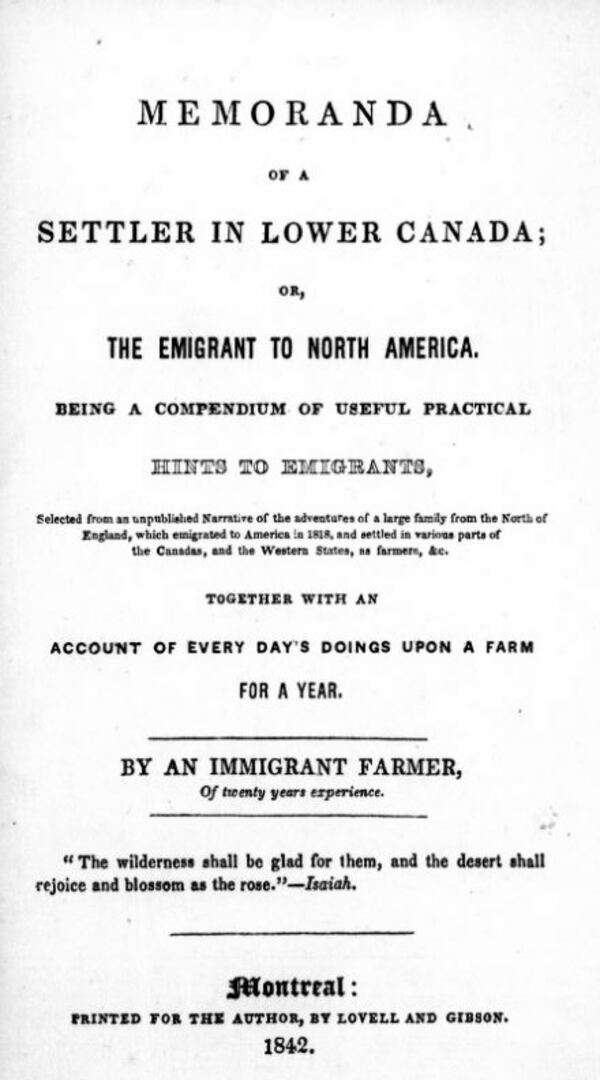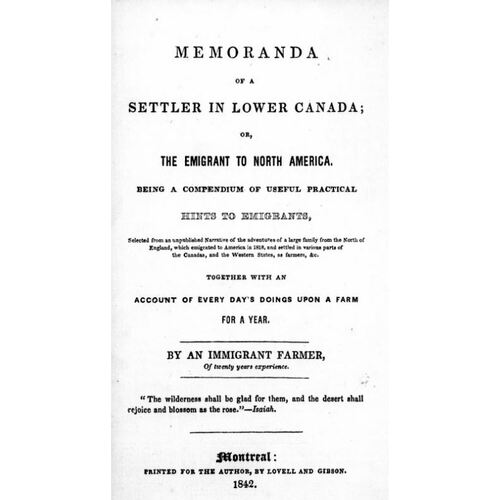
Source: Link
ABBOTT, JOSEPH, Church of England clergyman, educator, and author; baptized 10 June 1790 at Little Strickland, Westmorland, England, son of Joseph and Isabella Abbott; d. 10 Jan. 1862 in Montreal.
Born into an old Yorkshire family of modest means, Joseph Abbott first attended Bampton School, Bampton, Westmorland, and from 1808 to 1812 Marischal College, Aberdeen, Scotland, a college designed largely for sons of the upper classes. After graduation with an ma, he received ordination into the Church of England and accepted a curacy in Long Stratton, Norfolk, a populous parish where he immediately assumed large responsibilities. Although “not without a fair and reasonable prospect of preferment at home,” Abbott, adventurous and ambitious with a romantic interest in North America, sought missionary employment with the Society for the Propagation of the Gospel. In 1818, at the age of 28, he left Britain with his younger brother William to take up a post at St Andrews (Saint-André-Est), Argenteuil seigneury, Lower Canada.
Abbott, unlike his latitudinarian predecessor, the Reverend Richard Bradford, was a high churchman who disdained dissenters, their camp meetings, and itinerant evangelists. A determined, energetic, and intelligent man with a flair for management, he began at once organizing the Anglican community, creating a parish structure, building churches, schools, a parsonage and glebe. He opened Anglican missions at Lachute, Hawkesbury, and Gore Township and provided Protestant service to the British troops at Grenville Settlement, thus augmenting his modest annual stipend of £200 from the SPG. In June 1822 Bishop Jacob Mountain* erected the parish of St Andrews and appointed Joseph Abbott its first rector. Three years later strife, poor health, and the desire “to break up fallow ground” persuaded him to exchange churches with his brother William, and he moved to the recently created Anglican mission near Yamaska Mountain, later named Abbottsford in the brothers’ memory. In 1830 he returned to Argenteuil County to take charge of a new Anglican mission at Grenville. Although he remained there until his retirement on pension from the SPG in 1847 he had in effect ceased to serve the congregation by 1845. In Grenville Abbott had built, at his own expense, the church and the parsonage, which he sold in 1848 to the SPG and the Society for the Propagation of Christian Knowledge. He also organized the Ottawa District Association of the Quebec Church Society, becoming its first chairman in 1844.
At Grenville, Abbott became absorbed in the Royal Institution for the Advancement of Learning’s attempts to create a network of parish schools throughout Lower Canada, an interest he had acquired while at St Andrews. He was commissioner for Argenteuil County and visitor to the schools at Chatham, Côte Saint-Charles, Rigaud, Gore, Grenville, and New Scotland, endeavours which required extensive travelling, time, and attention. He and his brother became “the real backbone” of the institution’s educational work in these communities.
Joseph Abbott also took a lively interest in the Royal Institution’s attempt to establish McGill University. He attended the first meeting of the university’s board of governors in 1829, and later accepted a wide range of duties: registrar and bursar (1843–52), librarian (1845–52), chaplain and vice-principal (1845–46), lecturer in history and geography (1846–52), and acting secretary to the board of governors (1843–52), all for an annual sum of £100. His administrative duties, however, were largely a sinecure which he owed to his friendship with the acting principal, John Bethune*, and for which he employed a deputy, his eldest son, John Joseph Caldwell Abbott*. A visitor’s report for 1844 criticized their bookkeeping as irregular and incorrect. Abbott, closely associated with Bethune’s policy of turning the college into an Anglican institution, lost much of his influence with Bethune’s dismissal in 1846.
Abbott also achieved a modest literary reputation in Canada and Britain. His two major works, Memoranda of a settler in Lower Canada; or, the emigrant in North America and Philip Musgrave, won immediate acclaim. The emigrant, first published as a series of articles in January 1842 by the Quebec Mercury, went through three editions in Canada and one in Britain, and was used by the Canadian government as promotional literature in Great Britain. Announced as a practical, judicious compendium for prospective agricultural immigrants to Canada, based on 20 years’ experience, this brochure offered a more subtle moral message, the superiority of Canada to the United States, by contrasting the morality, orderliness, and institutional amenities of church and state in Canada with the demoralized, riotous life of the American frontier, “the grave of Europeans.” Abbott continued this theme in Philip Musgrave, a scarcely fictional account of an Anglican missionary’s life drawn from his daily journal, comparing “true” religion’s prosperity in a monarchical system to its fate in the “neighbouring republic.” First printed in 1846 by a British publisher, it went through at least one other edition and like its predecessor was used to attract English immigrants to Canada. A third major work, “The halls of the north,” a 400-page manuscript, was reputedly lost in transmission to the publisher. In 1828 the Society for the Encouragement of Arts and Science in Canada, founded the previous year, had awarded him a silver medal for an essay, “A brief view of the advantages and defects of the present system of agriculture in Canada, and the means of improving it in all its departments.” He also contributed numerous short stories, based on Scottish border adventures, to the Literary Garland, under the pseudonym, “A Monk of G[renville] Abbey” (the title of his country house).
Joseph Abbott married Harriet, the daughter of the Reverend Richard Bradford, on 10 Aug. 1820. They had seven children, of whom the eldest, John Joseph Caldwell, became prime minister of Canada and the fifth, Harry Braithwaite, a distinguished engineer.
The career of Joseph Abbott, an intelligent, talented, articulate Tory and a dedicated, energetic missionary of Anglicanism, convinced of the need to buttress throne and altar in a colonial society, suggests the nature of the Anglican design in early 19th century Canada.
[In addition to the stories published in the Literary Garland (Montreal) from 1839 to 1850, Abbott wrote, as has been mentioned, the two works that follow, the first under the pseudonym “An immigrant farmer”: Memoranda of a settler in Lower Canada; or, the emigrant to North America, being a compendium of useful practical hints to emigrants . . . together with an account of every day’s doings upon a farm for a year (Montreal, 1842; 3rd ed., Edinburgh and London, 1844); Philip Musgrave; or memoirs of a Church of England missionary in the North American colonies (London, 1846). c.m.]
ANQ-M, État civil, Anglicans, Christ Church, 10 Aug. 1820, 10 Jan. 1862. McCord Museum, Library file, Joseph Abbott to Thomas Kains, 14 Feb. 1853, 11 Feb. 1855. McGill University Archives (Montreal), Minutes of the board of governors, 29 June 1829, 14 July 1843. Can., Prov. of, Legislative Assembly, Journals, 1849, III, app.G.G.G.G. Church of England, Church Soc. of the Diocese of Quebec, Annual report (Quebec), 1844. Montreal Gazette, 13 Nov. 1861–30 April 1862. Montreal Transcript, 1 Oct. 1844–1 March 1845. Pilot (Montreal), 15 Aug.–15 Nov. 1861. Quebec Gazette, 17 April 1828. Cyclopaedia of Canadian biog. (Rose, 1888), 740. A. R. Kelley, “The Quebec Diocesan Archives; a description of the collection of historical records of the Church of England in the diocese of Quebec,” ANQ Rapport, 1946–47, 71, 189, 192. L.-P. Audet, Le système scolaire, IV. R. G. Boulianne, “The Royal Institution for the Advancement of Learning; the correspondence, 1820–1829, a historical and analytical study” (unpublished
Cite This Article
Carman Miller, “ABBOTT, JOSEPH,” in Dictionary of Canadian Biography, vol. 9, University of Toronto/Université Laval, 2003–, accessed February 25, 2026, https://www.biographi.ca/en/bio/abbott_joseph_9E.html.
The citation above shows the format for footnotes and endnotes according to the Chicago manual of style (16th edition). Information to be used in other citation formats:
| Permalink: | https://www.biographi.ca/en/bio/abbott_joseph_9E.html |
| Author of Article: | Carman Miller |
| Title of Article: | ABBOTT, JOSEPH |
| Publication Name: | Dictionary of Canadian Biography, vol. 9 |
| Publisher: | University of Toronto/Université Laval |
| Year of publication: | 1976 |
| Year of revision: | 1976 |
| Access Date: | February 25, 2026 |



